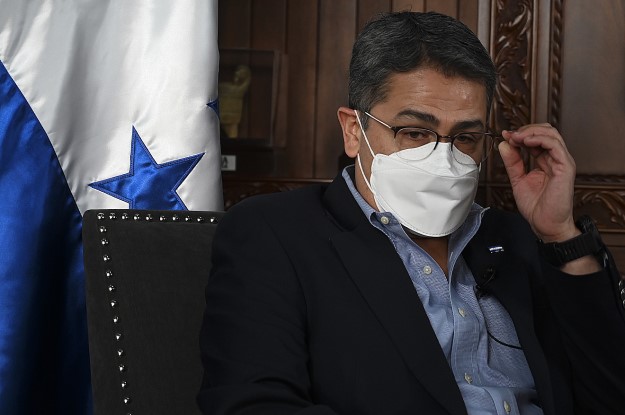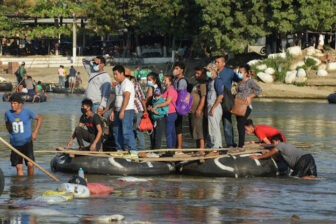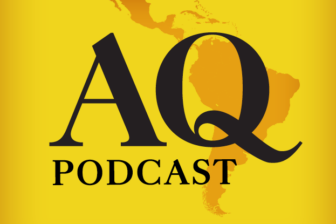This article was updated on March 30, 2021.
A U.S. Justice Department (DOJ) investigation of a sitting president would usually come as something of a bombshell. But when news broke on Feb. 8 that federal prosecutors had begun investigating Honduras’ President Juan Orlando Hernández, it came as more of a formality. Hernández, or JOH, had already been implicated or directly accused of involvement in drug trafficking by U.S. prosecutors in multiple court filings over the last several years — he had just made news for allegedly having said he wanted to “shove the drugs right up the noses of the gringos.”
But while the administration of former President Donald Trump had played down allegations against the Honduran president in exchange for cooperation on immigration, President Joe Biden’s plan for the region, per its own language, “puts combating corruption at the heart of U.S. policy in Central America.”
A longtime U.S. partner, Honduras will quickly put the new administration’s policy reset to the test.
“The U.S. is continuing to deepen its intelligence sharing with the Honduran military and police in the name of fighting drug trafficking, even as we have more and more evidence that they are themselves drug traffickers, including at the very top,” said Dr. Dana Frank, a Honduras expert and emerita professor at the University of California at Santa Cruz.
The Biden administration’s plans to step-up collaboration with security and law enforcement agents would mean, for example, dealing directly with Attorney General Oscar Chinchilla, who has also been named in DOJ filings: Hernández is cited as saying the attorney general would provide protection for drug-trafficking activities.
Other policy promises, such as “revoking visas to the United States and freezing assets of corrupt individuals” from the region, could place the administration in a diplomatic bind, forcing it to either come to terms with DOJ evidence or feign ignorance. The same goes for the recently passed Engel List legislation, which will require the Biden administration to publish a list of “corrupt and undemocratic actors from El Salvador, Guatemala and Honduras who will be denied entry to the United States.”
In the 2020 Transparency International’s Corruption Perceptions Index (CPI), Honduras has fallen to its worst score since 2012. At 24, it is just above the three worst offenders in the region, Nicaragua, Haiti and Venezuela.
“Rather than the raw number, what’s worse is that we are backsliding,” said Pedro Barquero, director of the Cortés Chamber of Industry and Commerce, an influential business group located in San Pedro Sula. In addition to the CPI, he pointed to Honduras’s deteriorating rule of law, as measured by the World Justice Project.
DOJ court filings have accused JOH of marshalling security officials to shield drug traffickers in a bid to consolidate political power. His brother, Tony Hernández, was convicted of drug trafficking by a New York jury in 2019 and stands accused of receiving $1 million from Mexican drug leader Joaquin “El Chapo” Guzmán – funds allegedly destined for JOH. On March 30, Tony Hernández was sentenced to life plus 30 years in prison.
“This is a systematic and intentional destruction of the rule of law by our authorities in order to concentrate power in the hands of a small group,” said Barquero.
Experts say efforts to combat corruption over the last several years — some of the very initiatives supported by Biden in his time as vice president — have been gutted or reappropriated by JOH.
Best known is the administration’s decision not to renew the mandate of the Mission to Support the Fight against Corruption and Impunity in Honduras (MACCIH) in 2020. Created with U.S. support, and despite lacking the substantial mandate of its U.N.-backed counterpart in Guatemala, the OAS-backed MACCIH had pulled 120 allegedly corrupt individuals into its sights by April 2019, including investigations into 70 government officials.
The MACCIH brought anti-corruption efforts into a more visible light, said Ismael Zepeda, an economist at the Social Forum on External Debt and Development of Honduras, a think tank. “That’s why it became such a stone in the shoe of the Hernández administration. He had to eliminate it.”
Within months of the MACCIH’s expiration, many of its highest-profile cases, including the $12 million Pandora case, were derailed.
2016’s police reform commission took a similar turn. Initially headed by Security Minister Julián Pacheco, also implicated in DOJ drug-trafficking related investigations, the U.S.-backed reform suffered criticism for its opaque dismissal protocol. “Many police aligned with drug trafficking were allowed to remain,” said Isabella Orellana, former dean of the San Pedro Sula campus of the National Autonomous University of Honduras. Among those fired, the vast majority were not charged, and “many ended up either joining or continuing to cooperate with criminal organizations,” said Tiziano Breda, a Central America analyst at Crisis Group.
The potential for fraud in November’s presidential elections also underscores the challenge facing Washington, which is yet to call for free and fair elections.
According to the Organization of American States (OAS), the 2017 elections that granted Hernandez his second term — after he orchestrated an end to constitutional term limits — were “characterized by irregularities and deficiencies.” A package of electoral reforms begun in 2019 have not been fully ratified into law, meaning this year’s elections will take place under the same legislation that allowed 2017’s alleged fraud to take place.
“This is an issue that the U.S. needs to look at quickly,” said Adriana Beltran, director of citizen security at the Washington Office on Latin America. “We are seeing an election with a very similar framework to the last one, and we know how that turned out.”
This article was updated to include details of Tony Hernández’s prison sentence.
—
Ruge is a freelance journalist based in Rio de Janeiro







